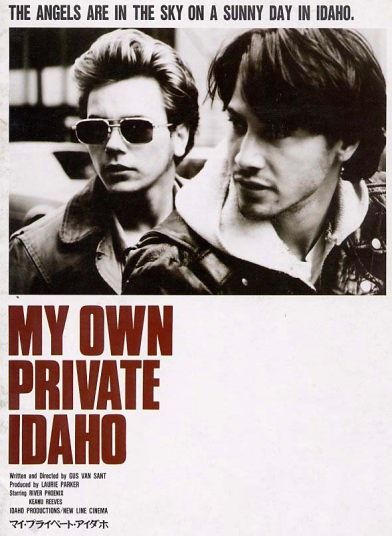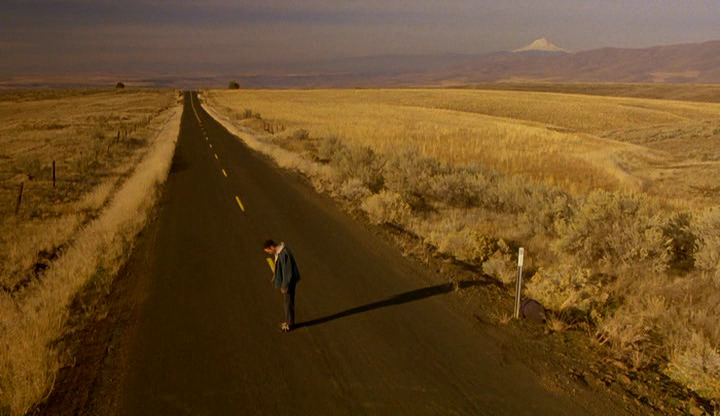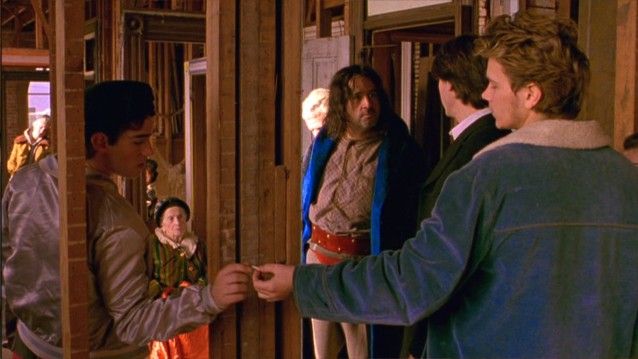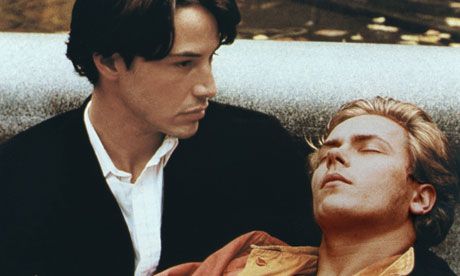My Own Private Idaho
1991
Director: Gus Van Sant
Starring: River Phoenix, Keanu Reeves,
William Richert
The story opens with a shot of
Mike (Phoenix) on a road in the middle of nowhere. Although the movie will take us far from this
location, this is the emotional core of the story. We learn more of Mike’s story, how he was a
street hustler (re: prostitute) in the Northwest, befriending fellow street kid
Scott (Reeves), who also happens to be the heir to a wealthy family. Adventures and hijinx ensue upon the arrival
of Bob (Richert), a gay overlord of the displaced street kid family. Later, we follow Mike as he searches
desperately for his birth mother, and feel for him as he falls in love with
Scott.
The theme of those living on
the outskirts of society has never held a huge attraction for me. This can probably be traced back to an overly
ambitious Reading teacher in seventh grade who insisted we each do a massive
project on The Outsiders. The overexposure
turned that story into one of my least favorite ever, and I still get a bit of
a bad taste in my mouth when exposed to it.
However, despite not being quite my cup of tea, My Own Private Idaho is
very good at portraying that life in a manageable, understandable, yet
unsentimental fashion, somewhat on par with the world that Jon Voigt inhabits
in Midnight
Cowboy. That’s probably Van
Sant’s greatest accomplishment in this film: while watching it, I was bemused
and slightly intrigued. When it was
over, I started thinking about what I had seen, and the emotional impact
started to hit me. These are sad, sad
people in this film, but Van Sant keeps the crippling depression at bay until
the audience is ready to drink it in.
Easily my favorite aspect of
the film is the utterly bizarre yet beguiling Shakespearean section in the
middle. About a third of the film, that
involving Bob and the street kids as opposed to Scott and Mike on their own, is
a full on modern adaptation of Henry IV, with a touch of Henry V
thrown in for good measure. Because of
the source material, it’s also an adaptation of Orson Welles’ Chimes
at Midnight (1968), which is, you guessed it, an adaptation of Henry
IV and Henry V. Van Sant is
paying homage to Welles in these sequences.
Bob is clearly Falstaff, wearing a bathrobe that quickly starts to pass
as a cloak, and a costume that seems to have a codpiece. He practically speaks in iambic pentameter,
as does everyone else around him. To his
Falstaff is Scott’s Prince Hal, heir to a fortune but hell bent on sowing his
wild oats amongst the street urchins. Even
the soundtrack changes to one of Elizabethan instrumentation. It doesn’t take long to figure out that My
Own Private Idaho has made the turn from loner story to
Shakespeare.
This is my favorite part of the
film because I have long been fascinated with how Shakespeare is adapted in
film. I like the idea so much, I did an
independent study course on it in college, one-on-one with my Shakespeare
professor, despite the fact that I majored in Biochemistry. I love to see how society continues to find
relevance in Shakespeare’s work by updating it and applying it to new
situations.
Given, then, my fascination
with this idea, I got legit excited when I started to see the Shakespeare in My
Own Private Idaho. Despite the
fact that Keanu Reeves started to struggle with the dialogue here (while not
lifted directly from the plays, the dialogue is significantly elevated in this
section), I loved seeing how Van Sant equates Falstaff’s found family with that
of Scott and Mike and street kid prostitutes.
Imagine my disappointment when,
just as abruptly as we dive into a Shakespeare retelling, Van Sant takes us
right out of it again. With the
Shakespeare section, we explore Scott and his relationship with the street kids
and his father. The non-Shakespeare
section, though, focuses instead on Mike.
This is a much sadder, considerably less farcical portion of the
film. There is humor, to be sure (a
German john named Hans was good for a handful of laughs, as was the john who
dressed Mike up in aprons and called him “Little Dutch Boy”), but the tone is
much more downbeat. Van Sant keeps it
idiosyncratic enough (I very much enjoyed the “talking magazine covers”
sequence) to prevent full blown pessimism, but it lacks the energy of the Shakespeare
section.
Although I greatly preferred
the Shakespeare section, it is in the other two thirds of the film that River
Phoenix really shines as Mike. Mike is a
narcoleptic, a fact told to us in the very opening of the film, and he
collapses at terrifically inopportune times throughout the story. Scott is always there to take care of him,
though. Puts him in a cab, pulls him to
safety, keeps him out of trouble. It’s
easy to see how Mike, a loner, emotionally attaches himself to Scott, a
hedonist, only to ultimately find himself alone yet again. Phoenix is all physicality, twitchy and
tetchy, with his constantly shrugged shoulders showing how he is withdrawing
from his world. He is mumbling and
fumbling, but when he slowly and awkwardly admits his feelings for Scott, it’s
emotional and sad.
Ultimately, I felt too much of
a disparity between the Shakespeare portion and the Mike’s story portion. While Van Sant plays freely with film
composition, employing several little oddities (stop-motion camera shots,
freeze frames that aren’t freeze frames, animation, iris camera shots), the two
parts are too different for me to reconcile them to the same movie, the same
story. Truth is, they aren’t the same
story – Mike’s story versus Scott’s story – but it’s too far of a stretch to
explain away as simply “idiosyncratic.”
It’s far too cut and paste for my taste.
I ended up wanting more of the Shakespeare section; make a movie of that
on its own. I would love that. And while yes, Mike’s story is the heavy heart
of the film, I’d rather watch the Shakespeare section.
Overall, My Own Private Idaho is a
quirky yet un-melodramatic look at street culture and loneliness. The search for belonging is one that will
never end for some. The end of the film,
somewhat ambiguous, I read as an unhappy epilogue to a fairly unhappy story,
indicative of fantasy and perhaps heaven, not reality. Others read it as a hopeful ending. It’s a good ending, though; fitting to the
oddball little flick that Van Sant created.
Arbitrary Rating: 7.5/10




I happened to see this for the first time just a couple of weeks ago. I actually didn't know what Shakespeare story it might have been based on while I watched it; I just picked up on the dialogue. It wasn't until afterwards that I read about the Henry IV connection. I actually saw the Falstaff character as a Fagin character from Oliver Twist while I was watching the movie.
ReplyDeleteThis isn't a van Sant film that I'd recommend to others. That's not because of the subject matter, but rather the presentation. It didn't turn me off, but I know it could be off-putting to many. I felt this was a middle of the road kind of movie (and that phrase came into my head seriously, not as a pun, but as I was typing it I realized that it would sound that way.)
Yes, I'd be hesitant to recommend this based on its changes in tone and story, and all the little weird techniques van Sant uses. I mean, I enjoyed it to a degree, but I'm uncertain if others would. And I know that my Shakespeare thing is, well, MINE, and not everyone starts salivating at the thought of a Shakespeare retelling the way I do. (btw, I am practically peeing myself with anticipation for Joss Whedon's new "Much Ado About Nothing.")
Delete"Middle of the road..." come on, Chip, take credit for being that clever!
I'm looking forward to it, too. I liked Branagh's version back in the day.
DeleteAnd the middle of the road thing I felt was a groaner if it was intended to be real...along the lines of the kid's joke "What happened when the red ship hit the blue ship? The passengers were marooned."
Oh, I looooooove Branagh's version - it was the VERY first costume drama film I ever saw, and the very first Shakespeare adaptation I ever saw, and it had a huge effect on me. I fell in love instantly and, frankly, it heavily influenced my taste for years afterwards. I wanted more.
DeleteWhedon's Much Ado looks very cool, very hip, very fun.
I'm all for punny stuff every now and then!
golden goose outlet
ReplyDeleteyeezy boost 350 v2
off white
bape clothing
bapesta
birkin bag
supreme t shirt
supreme clothing
hermes
bape